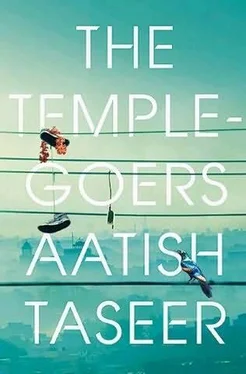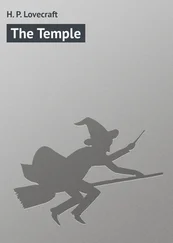I had thought I was alone, but Aakash’s sudden appearance on the landing made me wonder whether he might have observed my arrival. Since we were visiting temples, I wore Indian clothes, an off-white kurta and a white pajama. Aakash now appeared in faded jeans and a striped beige and white knit T-shirt. My embarrassment was not easily explained. All I knew was that Aakash wore the Western clothes because he could. It was like so much else about him.
‘Hi, man,’ he said, reaching in to give me a hug. ‘Looking fit.’ Then, laughing and switching to Hindi, he added, ‘Yaar, my house is very scattered. Please don’t take it badly. I’m ashamed that you’re seeing it like this.’
But I realized as we climbed the cement steps that the embarrassment would be all mine and none his. Aakash didn’t know embarrassment; it was an aspect of his confidence. My embarrassment, which he would draw out, did not offend him as much as it aroused his curiosity. It was as if he wanted to know every detail of how his world would look once he’d left it behind.
The room we entered past a wire-mesh door and then a full metal door had powdery pink walls. Immediately in front of us was a large cloth hanging of Radha and Krishna and a blue sequined cow against a black background. The room was small and full of people. I couldn’t take it in at once. There were some men, a large woman in a bright yellow and orange sari, someone held a baby. As soon as I entered, everyone quickly greeted me and dispersed. They did it with such alacrity that I had the feeling this was a standard courtesy extended to anyone who brought guests to the little flat.
These men were also in trousers and shirts, and seeing them, I began feeling unprotected in the loose, light clothes I wore. Once the room emptied, only Aakash and his father, a man with a youthful face and heavily dyed hair, white at the roots, remained. I looked for Aakash’s face in his, but it lacked the fineness of his features, and though lighter in tone, was a flatter colour. For some moments no one spoke.
‘Will you have tea and biscuits?’ Mr Sharma asked.
‘Sir, you’ll have to ask my trainer,’ I said, trying a joke. ‘I never eat or drink anything without his permission.’
Aakash’s father smiled proudly. Aakash swelled with laughter, which, at once self-deprecating and vain, filled the room.
The noise drew out a large toddler from behind a curtain, separating the sitting room from the rest of the flat. He came charging in, breaching the unspoken barrier between guest and family, and threw himself into Aakash’s arms. His mother, the daughter-in-law, ran in after him, holding a bottle of milk. She was short and quite wide, with dark skin and silvery red lipstick. The gold jewellery she wore on her wrists, neck, nose and ears stood out against the colour of her skin. Dark blue flowers grew over her pale blue and white chiffon sari. Greeting me with an embarrassed smile, she tried to retrieve the child, who had already crawled on to his uncle’s shoulders. Aakash reached behind him, and exactly as though performing a two-arm dumb-bell extension, lifted the child from his shoulders and swung him in front of the Krishna-Radha hanging. He pointed at the blue cow; the toddler’s face shone with delight. It extended an unsteady finger in the direction of the animal and said, ‘Tawoo’. Aakash guffawed, and turning to me, whispered, ‘Cow,’ the English word more magical to him than to the boy.
His mother reached again for him. Aakash ignored her, swinging the child back into his lap. Without looking up, he took the bottle from his sister-in-law’s hand. She looked to me and said, ‘He’s very attached to his uncle.’ Mr Sharma who was silent until now said, ‘Yes, watch this.’ He called to the child, who craned its neck to see him, then hit Aakash on the shoulder. An expression of fury came over the child’s face. He did it again and the child jumped up, then held by Aakash, advanced on his grandfather, gnashing two tough little teeth and swinging his arms and legs. When Mr Sharma hit Aakash again, the child let out a piercing scream.
Aakash calmed him by rubbing the boy’s face against his. Then lowering him on to his back, he put the bottle in his mouth. His ease with the child and the sight of it drinking contentedly from Aakash’s heavy, dark arms riveted everyone in the room. Aakash, aware of the unsettling beauty of the scene, turned to me and said, ‘I’m a trainer, but I can do these things as well.’
I watched in silence. This brief, physical scene in the small room, with the hidden flat beyond, made me feel that certain boundaries were being preserved on my account. A tension built on their edges, while the thought of their loosening unnerved me.
The child’s mother, as if forever dismissed in this way, showed her guile as a daughter-in-law. She feigned a huff, making it seem that Aakash instead of showing her up before a guest was doing her a favour. ‘Then you feed him, nah?’ she said, and flounced off.
It was this child, who wore a neon-green T-shirt with a string of unconnected words on the back – ‘Yo, yo graffiti’ and ‘Come out, let’s play’ – whose long curls, I discovered, were to be offered up that morning at a village temple.
Until now, my heightened awareness and inward concentration had made it difficult for me to take in the situation around me. But now I wondered what the delay was. Why were we sitting here in the first place? Some preparation seemed to be under way in the flat, but I couldn’t tell what.
Aakash yelled at the curtain, ‘Ma, come on, hurry up. We should leave quickly. Papa, please tell them to hurry.’
Mr Sharma nodded, rose and disappeared behind the curtain. I wanted to see the rest of the flat, but was somehow unable to ask to be shown it.
When we were alone, I said, ‘Aakash, can I use the bathroom?’
A look of dismay ran over his face. He seemed caught between his host’s willingness to satisfy any request of mine and an opposing desire to keep me in the visiting room. He said, ‘Yes, yes, of course,’ and then, as if submitting to the inevitable, added, ‘I may as well show you the rest of the house.’
He flicked aside the curtain. I was faced suddenly with a short, dim length of corridor. It ended so abruptly that it was almost as if there was no flat behind the curtain. On my left, there was a tiny strip of kitchen crowded with three busy women in bright clothes. It had a purple fridge and a gas stove. A faint light came in from a frosted-glass transom over an exhaust fan caked in grime. A few steps further, there was a darkened bedroom with a single red bulb and a low bed.
‘This is one room,’ Aakash said. ‘We’ve given it to my brother and his wife.’
The door of the other room was also open. A tube light with a black underbelly glowed brightly. Every inch of the room was covered in mattresses. It answered my questions: three in one room, four in the other.
Maybe feeling we’d come too quickly to the end of the flat, Aakash pushed open a further door to reveal a small terrace. It was cluttered with the skeletal remains of an old cooler and stacks of bedding, perhaps for when relations came to stay. Beyond a spiked wall, there was a large field of parched, uncultivated land, where a village of blue plastic tents had sprung up. The haze was burning away, the sky blanching fast.
We withdrew into the passage. Aakash pulled aside another curtain, revealing a sink and a cemented area with a tap, a plastic bucket and a metal door.
He opened the door for me. I stepped inside and slid the cold iron bolt into place. Only then, in the damp, dark confines of this cement strongroom, did the full force of my reaction break violently over me. I wished with all my heart that Aakash didn’t have to live here. It was too ugly to think of someone with his charisma and ambition, and yes, physical beauty too, spending those treasured Sundays on a mattress on the floor. Was this where he crept in late at night to find a space among the sleeping bodies?
Читать дальше












